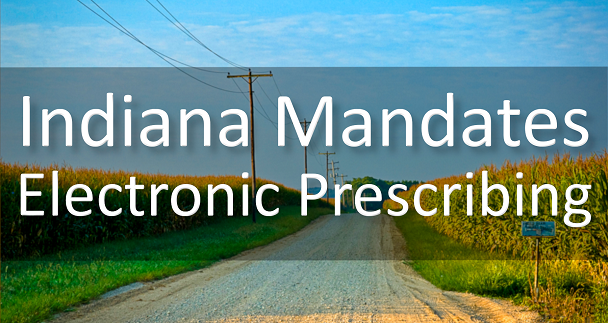Posted by MDToolbox
on
• Comments
(0)

Indiana Governor Eric Holcomb recently signed SB176 into law. This Act mandates Indiana healthcare providers to electronically prescribe all controlled substances with an effective date of January 1st, 2021. This bill began as an 8-line document allowing patients to transfer their prescription to another pharmacy. Several amendments were made in the two weeks it took the Indiana House and Senate to pass the bill bringing it to 15 pages in length.
Other subsections include:
- The Act amends several sections of state code by adding the phrase “or electronically transmit” to add electronic prescribing as a valid means of prescribing.
- There are provisions in the Act for a waiver system with similar circumstances for approval as other states have enacted. Some of these include: economic hardship, technological limitations, and other circumstances determined by the board.
- Pharmacies are not required to verify if a controlled substance prescription received via written, oral, or fax falls within the state and federal laws.
- The Act allows for advanced practice registered nurses to send prescriptions under their own credentials once they have met the requirements established by the board, previously nurse practitioners were required to send prescriptions under a supervising physicians’ credentials.
- Telemedicine is also addressed in this Act. Indiana has allowed for the prescribing of controlled and non-controlled (excluding opioids) prescriptions for telemedicine providers so long as certain criteria is met. One regulation is that an Indiana licensed practitioner has seen the patient in person and developed a medical plan that the telemedicine prescriber is following. (Note: Stay tuned for our next blog concerning U.S. Wide Telemedicine Prescribing that goes into more details about the uncertainty of telemedicine and the current laws governing it.)
Indiana has remained below the national average for opioid-related overdose deaths since 1999, following the national trend and increasing in number of deaths. However, the rate has increased sharply in recent years catching up with the national average. If the rate continues as forecasted, it will pass the national average for the first time since the National Institute on Drug Abuse has been collecting data. Prescription opioid overdose deaths decreased in 2011 but have begun to rise again in recent years along with heroin and synthetic opioid deaths. Indiana enacted SB226 on April 26th, 2017, the Act limits the first fill prescription of opioids to seven days for adults. The law also limits opioid prescriptions for minors to seven days. Prescriptions can exceed seven days under certain circumstances, such as the doctor determines that the patient requires it and if the patient is in palliative care.[1]
Indiana currently has a 30.5% provider enablement for electronic prescribing of controlled substances, which is just below the national average of 33.4%. Pharmacy enablement for EPCS is 97.8% which is above the current nation average for pharmacies, which is 95.2%.[2] There will likely be a big push leading up to 2021 to secure electronic prescribing, MDToolbox encourages providers not to wait!
Indiana now aligns with several other states mandating electronic prescribing. MDToolbox looks forward to working with providers throughout Indiana to ease the transition and help provide tools and resources in combating the opioid epidemic. With MDToolbox providers have access to tools such as Electronic Prescribing of Controlled Substances (EPCS) and convenient on the go mobile e-prescribing. Contact us for more information or to start your free 30 day free trial.